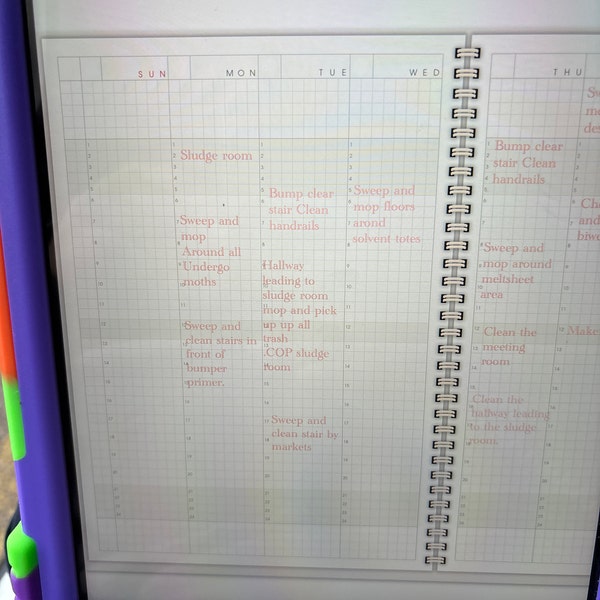Navigating The Landscape Of ADHD: Exploring Inside Our ADHD Minds

Table of Contents
Understanding the Neurobiology of ADHD
ADHD isn't simply a matter of "lack of focus." It's a neurodevelopmental disorder rooted in neurological differences within the brain. Understanding the "ADHD brain" helps demystify the condition and fosters empathy.
- Dopamine and Norepinephrine Imbalances: These neurotransmitters, crucial for attention, focus, and motivation, are often imbalanced in individuals with ADHD. This imbalance can lead to difficulties with executive function, impulse control, and sustained attention.
- Differences in Brain Structure and Function: Neuroimaging studies have revealed structural and functional differences in certain brain regions, particularly the prefrontal cortex (responsible for executive functions) and the basal ganglia (involved in motor control and reward processing), in individuals with ADHD. These differences contribute to the characteristic symptoms of ADHD.
- Genetic and Environmental Factors: Both genetics and environmental factors play a role in the development of ADHD. Genetic predisposition significantly increases the risk, but environmental factors, such as prenatal exposure to toxins or complications during birth, can also contribute. Research continues to unravel the intricate interplay of these factors in neurological ADHD.
Common Symptoms and Challenges of ADHD in Adults and Children
ADHD manifests differently across the lifespan, posing unique challenges for both children and adults.
ADHD in Children
Childhood ADHD symptoms are often more noticeable and disruptive. Hyperactivity, impulsivity, and inattention are hallmarks of childhood ADHD.
- Hyperactivity: Excessive running, climbing, fidgeting, and difficulty remaining seated.
- Impulsivity: Interrupting conversations, acting without thinking, difficulty waiting their turn.
- Inattention: Difficulty paying attention to details, easily distracted, forgetfulness.
These symptoms can significantly impact a child's academic performance, social interactions, and overall development, leading to challenges in school and friendships. Early diagnosis and intervention are crucial for children with childhood ADHD symptoms.
ADHD in Adults
Adult ADHD often presents differently. Hyperactivity might be less pronounced, manifesting as restlessness or inner turmoil. However, challenges with organization, time management, and emotional regulation frequently persist.
- Difficulty with Organization and Time Management: Procrastination, missed deadlines, disorganization, and difficulty prioritizing tasks are common.
- Challenges with Emotional Regulation: Increased impulsivity, irritability, frustration, and difficulty managing emotions.
- Comorbidities: ADHD often co-occurs with other conditions, such as anxiety, depression, and substance use disorders. Recognizing and addressing these comorbidities is essential for effective ADHD treatment. Adult ADHD symptoms can significantly impact career success, personal relationships, and overall life satisfaction.
Effective Strategies for Managing ADHD
Managing ADHD effectively involves a multi-faceted approach, often combining medication, therapy, and lifestyle adjustments. There's no one-size-fits-all solution; an individualized plan is crucial.
- Medication: Stimulant and non-stimulant medications can help regulate neurotransmitter levels, improving focus, attention, and impulse control. While medication can be very effective for managing ADHD symptoms, it's important to carefully consider the potential side effects and work closely with a healthcare professional.
- Therapy: Cognitive Behavioral Therapy (CBT) and behavioral therapy can equip individuals with strategies for managing impulsivity, improving organization, and coping with emotional challenges. Therapy plays a crucial role in developing coping mechanisms and improving self-esteem.
- Lifestyle Adjustments: Diet, exercise, and sleep hygiene are critical. Regular physical activity, a balanced diet, and sufficient sleep can significantly impact focus and mood.
- Organizational Tools and Techniques: Time management apps, planners, and other organizational tools can provide structure and support in daily life. These tools are especially helpful for managing tasks, appointments, and deadlines.
Seeking Support and Resources for ADHD
Navigating the challenges of ADHD requires a strong support system. Numerous resources are available to provide guidance and assistance.
- CHADD (Children and Adults with Attention-Deficit/Hyperactivity Disorder): CHADD is a leading organization offering valuable information, support groups, and advocacy for individuals with ADHD and their families. Check their website for resources and local chapter information.
- Finding Qualified Healthcare Professionals: A psychiatrist or psychologist specializing in ADHD can provide diagnosis, treatment, and ongoing support. Look for professionals with experience in treating adults or children with ADHD.
- Support Groups and Online Communities: Connecting with others who understand the ADHD experience can provide invaluable emotional support and practical advice. Online forums and support groups offer a sense of community and shared understanding.
Conclusion
Understanding the complexities of ADHD, from its neurobiology to its diverse manifestations and effective management strategies, is crucial for improving the lives of those affected. Navigating your ADHD journey requires a holistic approach that incorporates medication, therapy, lifestyle adjustments, and a strong support system. Don't hesitate to seek professional help. If you suspect you or someone you know may have ADHD, reach out to a healthcare professional for a thorough evaluation and to discuss appropriate treatment options. Understand your ADHD, manage your ADHD effectively, and learn more about ADHD today. Take the first step towards a more fulfilling life by seeking the support you deserve.

Featured Posts
-
 Decoding The Nba Draft Lottery Rules And Procedures
May 13, 2025
Decoding The Nba Draft Lottery Rules And Procedures
May 13, 2025 -
 Delovoy Forum Rossiya Myanma Chto Ozhidat V Moskve
May 13, 2025
Delovoy Forum Rossiya Myanma Chto Ozhidat V Moskve
May 13, 2025 -
 Southern California Faces Mini Heat Wave This Weekend Stay Cool And Safe
May 13, 2025
Southern California Faces Mini Heat Wave This Weekend Stay Cool And Safe
May 13, 2025 -
 Mdhakrat Bray Fylm Aywl Knywl Aya Dy Kapryw W Brwdy Bazy Khwahnd Krd
May 13, 2025
Mdhakrat Bray Fylm Aywl Knywl Aya Dy Kapryw W Brwdy Bazy Khwahnd Krd
May 13, 2025 -
 Planning Your Perfect Winterwatch Experience A Comprehensive Guide
May 13, 2025
Planning Your Perfect Winterwatch Experience A Comprehensive Guide
May 13, 2025
Latest Posts
-
 Landman Season 2 Filming Update First Look At Ali Larters Comeback
May 13, 2025
Landman Season 2 Filming Update First Look At Ali Larters Comeback
May 13, 2025 -
 Resident Evil Afterlife A Deeper Look At The Fourth Film
May 13, 2025
Resident Evil Afterlife A Deeper Look At The Fourth Film
May 13, 2025 -
 30 Evvel Ezelott Leonardo Di Caprio Es A Heroin Fueggoseg Elutasitasa
May 13, 2025
30 Evvel Ezelott Leonardo Di Caprio Es A Heroin Fueggoseg Elutasitasa
May 13, 2025 -
 Ali Larter Returns In New Landman Season 2 Behind The Scenes Photos
May 13, 2025
Ali Larter Returns In New Landman Season 2 Behind The Scenes Photos
May 13, 2025 -
 Leonardo Di Caprio Es A Drog 30 Evvel Ezelotti Fordulopont
May 13, 2025
Leonardo Di Caprio Es A Drog 30 Evvel Ezelotti Fordulopont
May 13, 2025
